�
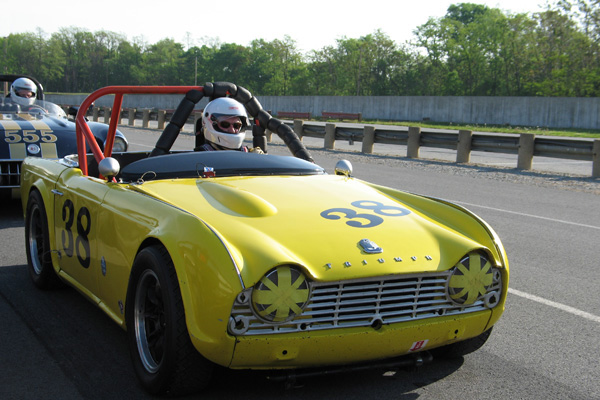
�
George Wright's 1961 Triumph TR4 Race Car
� � Owner: George Wright� City: Mechanicsville Virginia
� Model: 1961 Triumph TR4
� Engine: Triumph inline four (2188cc)
� Rebuilt by: James Bowler at Weldone�
�
From SCCA to Vintage Racing
��
George Wright purchased his Triumph TR4 in 1995, and he has owned it longer and raced it more �
than any of its previous owners. But whereas the car was previously raced in Sports Car �
Club of America (SCCA) events, George enjoys vintage racing. He frequently drives his TR4 �
in events sanctioned by the Sportscar Vintage Racing Association (SVRA), the Vintage Drivers �
Club of America (VDCA), and the Vintage Racer Group (VRG). �
�
�
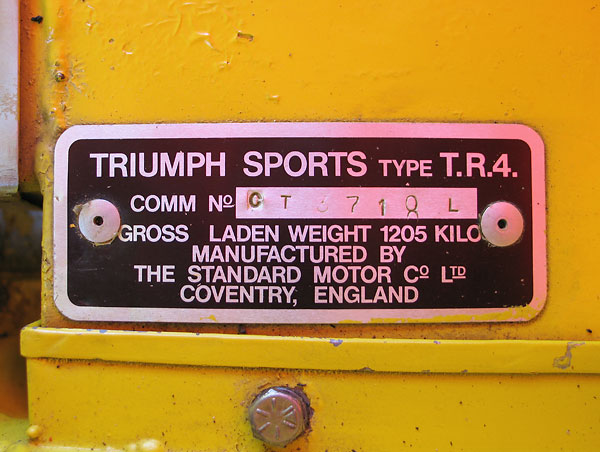
�
Triumph Sports Type T.R.4. / Comm No. CT3718L / Gross Laden Weight 1205 Kilo.
�
Manufactured by The Standard Motor Co. Ltd. / Coventry, England.
�
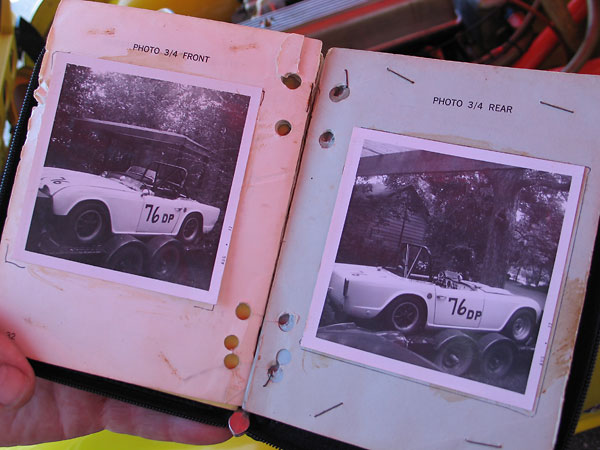
�
George Wright's Triumph TR4 has been a race car since 1972.
�
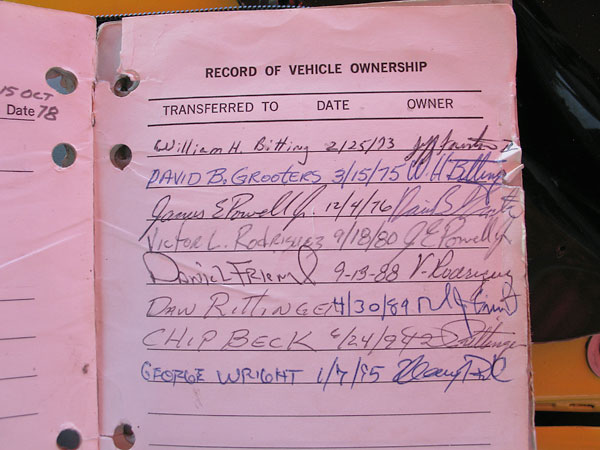
�
Over subsequent years, eight owners raced it in Sports Car Club of America's "D Production" class.
�
| Record of Vehicle Ownership | ||
| Jeff Fanton | (circa 1972) | |
| William H. Bitting | 2/25/1973 | |
| David B. Grooters | 3/15/1975 | |
| James E. Powell Jr. | 12/4/1976 | |
| Victor L. Rodriguez | 9/18/1980 | |
| Daniel Friend | 9/13/1988 | |
| Dan Rittinger | 4/30/1989 | |
| Chip Beck | 6/24/1994 | |
| George Wright | 1/7/1995 | |
�
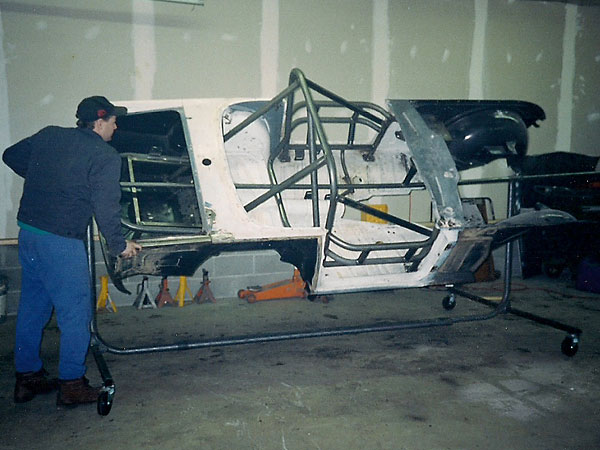
�
James Bowler created a new, heavy duty roll cage for George Wright's Triumph TR4.
�
�
Shortly after purchasing his TR4, George commissioned James Bowler of Richmond Virginia to�
go over the car and make sure it would be safe, strong, and competitive. James started by �
providing the car with a more extensive roll structure than we usually see in vintage sports �
cars. Constructed mainly of 1.75" diameter D.O.M. tubing, the roll cage includes NASCAR style �
side-intrusion protection across both door areas. These renovations were completed in 1997.�
�
�
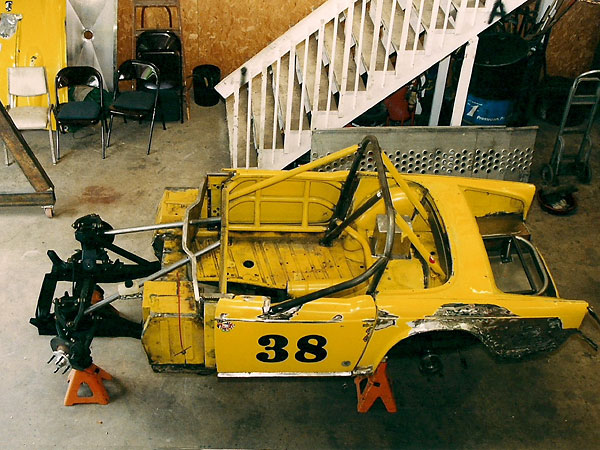
�
The rollcage extends to suspension mounting points on the frame.
�
�
Enjoying this article? www.BritishRaceCar.com is partially funded through generous support from readers like you!
�
To contribute to our operating budget, please click here and follow the instructions.
�
(Suggested contribution is twenty bucks per year. Feel free to give more!)�
�
Several years ago, George tested the strength of the roll cage at Savannah. It provided �
great protection, but the main hoop was severely abraded so the car was returned to James'�
shop, "Weldone", for repair. At the same time, the driver's side diagonal brace was relocated �
outboard for more shoulder room and extensions were added forward to the front suspension �
spring perches. The rollcage already extended all the way to the back where it ties into �
rear suspension mounting points and where it wraps around a twelve gallon Fuel Safe fuel cell. �
Besides being extra safe, this beefy and well integrated rollcage provides exceptional �
rigidity. Chassis rigidity is important because it facilitates fine tuning of the suspension �
and consistent feedback to the driver. �
�
�
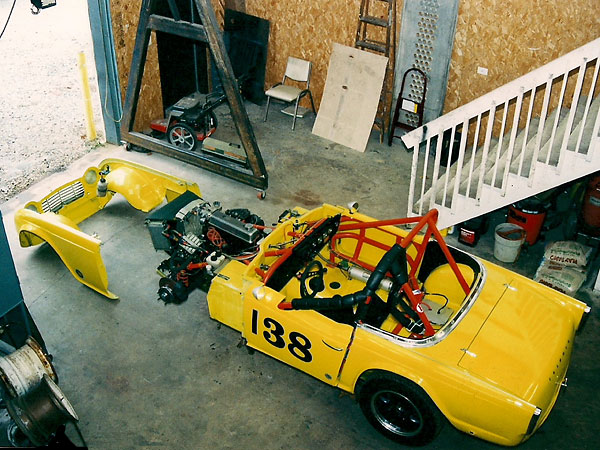
�
Triumph TR4 one piece front body clip.
�
�
James reconstructed the TR4 front body clip so that both front fenders and the grille �
surround all come off the chassis together as one unit. The removal process only takes �
a few minutes. He also created a clever removable cowl which provides easy access to �
the back side of the instrument panel. These construction details and many others are �
shown in close-up photos below. �
�
Please support the sponsoring companies who make www.BritishRaceCar.com possible, including:
�
 �
�
Features and Specifications
�| Engine: | �Triumph inline four, bored to 2188cc displacement and rebuilt to racing �
specifications by Abacus Racing of Virginia Beach, VA. �
Profile 24 Erson camshaft. �
Dual S.U. HS6 carburetors.�
Original Triumph TR4 intake manifold, with stiffeners added.�
Parabolic horn 5" diameter aluminum velocity stacks.�
Mallory Unilite distributor.�
Crane Fireball PS40 ignition coil.�
Accusump 3 quart oil accumulator with electrically operated valve.�
Racor screen type oil filter.�
Fram remote-mounted canister type oil filter. | �
| Cooling: | �Griffin aluminum radiator.�
Up-rated water pump, sourced through British Frame and Engine.�
Mocal oil cooler. | �
| Exhaust: | �four into one stainless steel headers from British Frame and Engine. | �
| Transmission: | �close ratio second and third gears. (Stock first and fourth gears.) Aluminum flywheel. | �
| Rear End: | �4.10:1 Salisbury, with limited slip differential. Southwick rear axle ends added. | �
| Front Susp.: | �Triumph TR6 (adjustable) lower control arm mounts. �
Southwick spindles and aluminum hubs.�
Triumph Competition springs (from the early seventies.) �
Carrera Hypershock telescoping shock absorbers. �
1.125" anti-sway bar. | �
| Rear Susp.: | �1/2 degree negative camber added by bending the axle tube.�
Custom trailing links and custom extended leaf spring shackles, both by James Bowler.�
Lever-arm shock absorbers. �
0.625" anti-sway bar. | �
| Brakes: | �(master) Tilton dual master cylinders with bias bar. � (front) stock disc brakes. � (rear) stock drum brakes. Wilwood residual pressure valve (red/10psi). | �
| Wheels/Tires: | �Panasport Racing 15" x 6" aluminum wheels. Hoosier Speedster 205/60 radial tires. | �
| Electrical: | �Nippondenso alternator. Gear reduction starter from TSI. | �
| Instruments: | �(left to right)�
Autometer tachometer (0-10000rpm),�
Stewart Warner Volt meter (10-16V),�
Stewart Warner oil pressure (5-100psi),�
Stewart Warner oil temperature (140-325F),�
Stewart Warner water temperature (100-265F),�
Westech dual pyrometer (700-1600F).�
| �
| Fuel System: | �Fuel Safe 12 gallon fuel cell.�
Fram fuel filter. �
Facet fuel pump. �
Holley adjustable fuel pressure regulator. | �
| Safety Eqmt: | �Aluminum Racing Products drivers seat.�
G-Force five point cam-lock safety harness.�
Quick release steering wheel hub, on a Superior Performance Products steering wheel.�
FireBottle (5 pound Halon, manual pull-type) fire suppression system. | �
| Weight: | �1982 pounds. | �
| Racing Class: | �SVRA / VDCA / VRG Group 3. | �
�
Please support the sponsoring companies who make www.BritishRaceCar.com possible, including:
� �
 �
�
�
�
Engine Installation
��
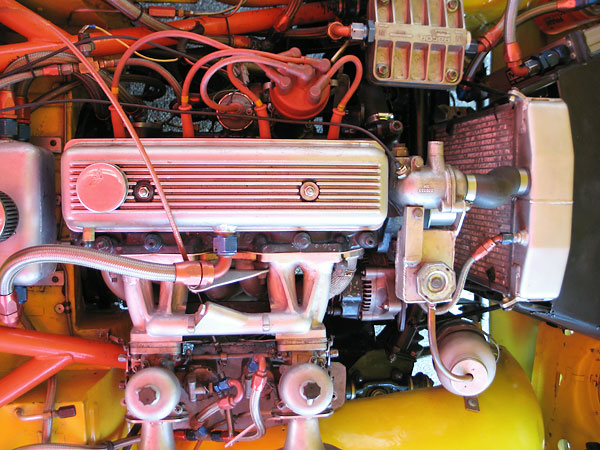
�
Triumph inline four cylinder engine, bored slightly oversize to 2188cc.
�
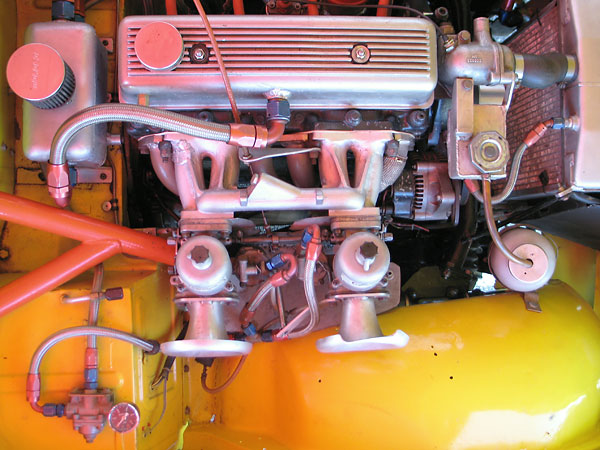
�
Dual S.U. HS6 carburetors.
�
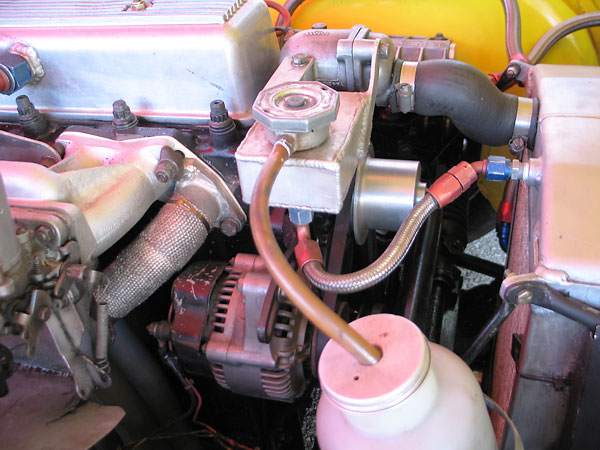
�
Four into one stainless steel exhaust header.
�
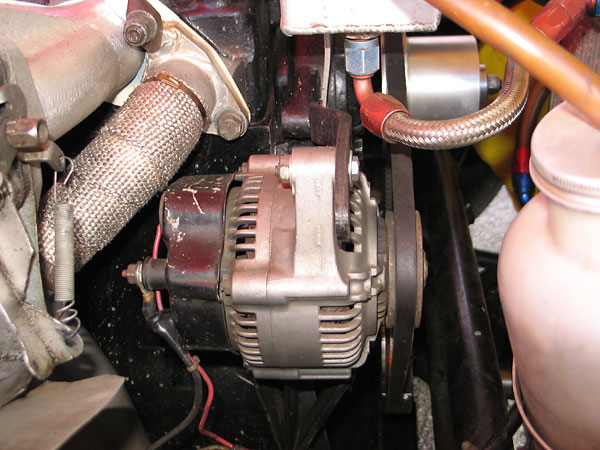
�
Small and lightweight Nippondenso alternator.
�
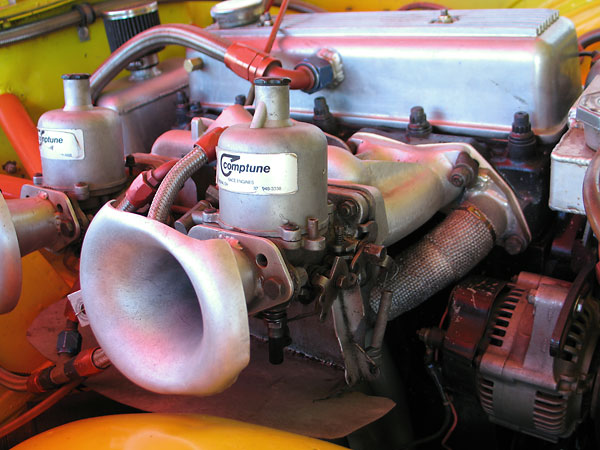
�
Parabolic horn 5" diameter aluminum velocity stacks smooth airflow into the carburetor throats.
�
Dave Taber at Comptune Race Engines in Medina Ohio set up the S.U. carburetors.
�
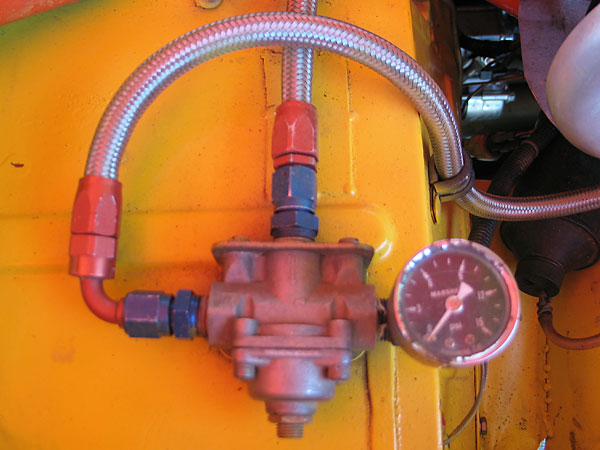
�
Adjustable fuel pressure regulator.
�
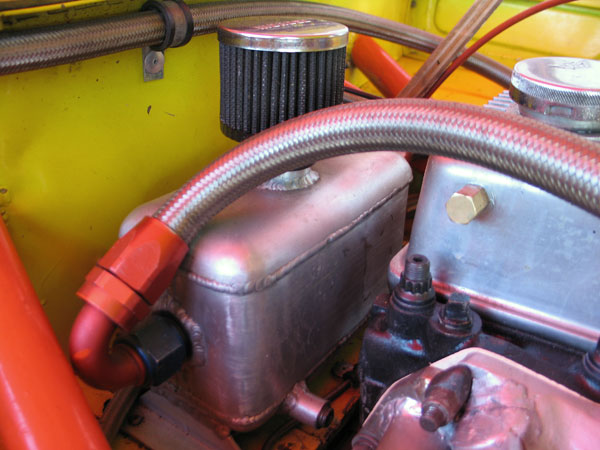
�
James Bowler fabricated this nifty custom aluminum breather tank.
�
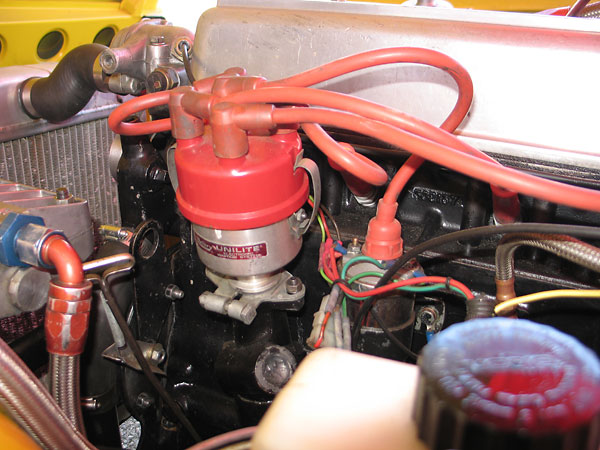
�
Mallory Unilite optical pick-up distributor and Crane FireBall PS40 ignition coil.
�
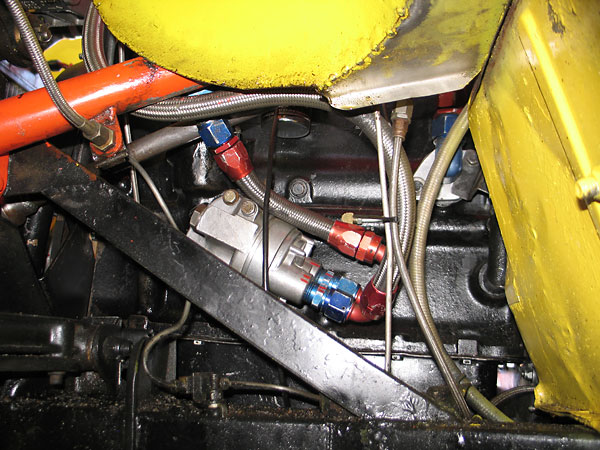
�
An adapter for a remote oil cooler is mounted on the left-hand side of the engine.
�
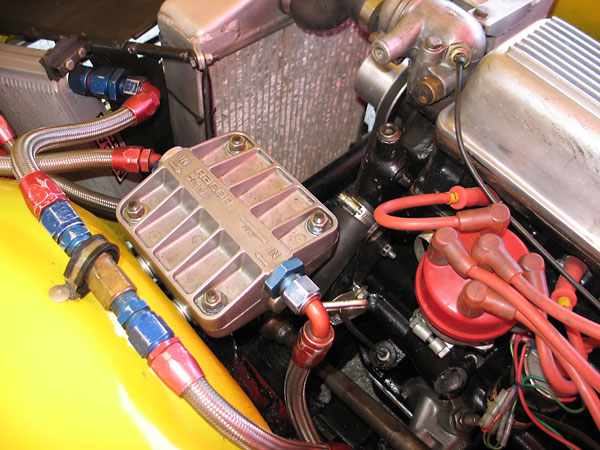
�
The Racor screen-type oil filter can easily be checked for debris after a race.
�
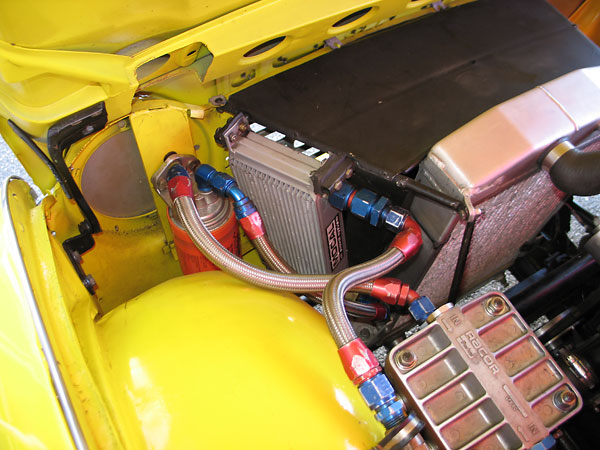
�
Griffin aluminum radiator, Mocal oil cooler, and Fram remote-mounted canister oil filter.
�
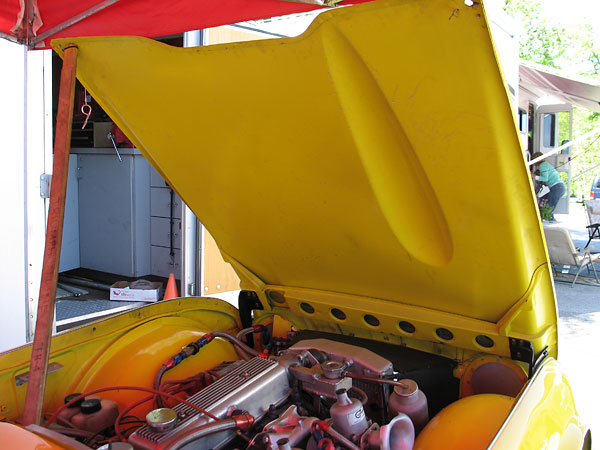
�
Somewhat lightened bonnet: a longitudinal reinforcement has been removed on the driver's side.
�
Front Suspension
��
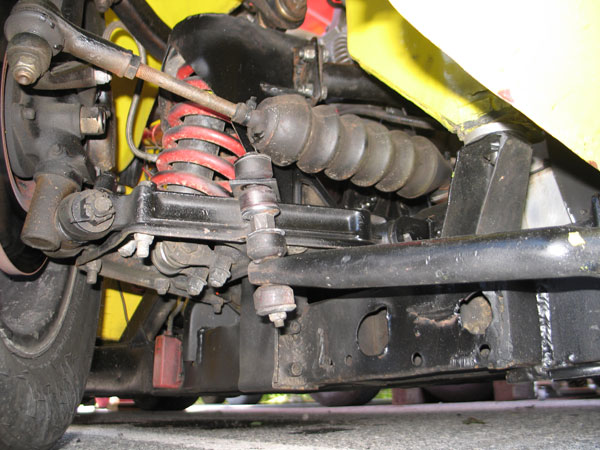
�
1-1/8" front anti-sway bar.
�
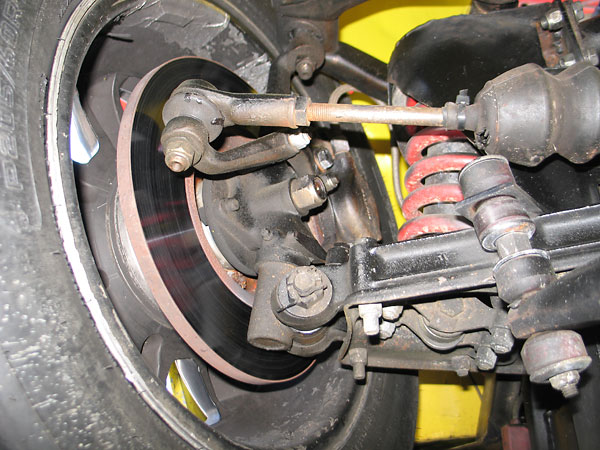
�
Southwick spindles and aluminum hubs.
�
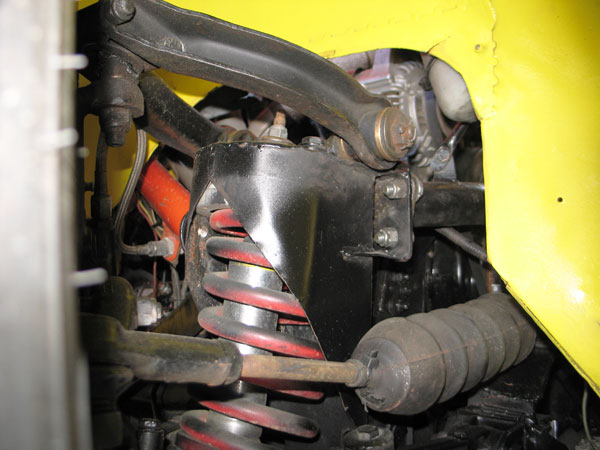
�
Stock upper control arms. Carrera Hypershock telescoping shock absorbers.
�
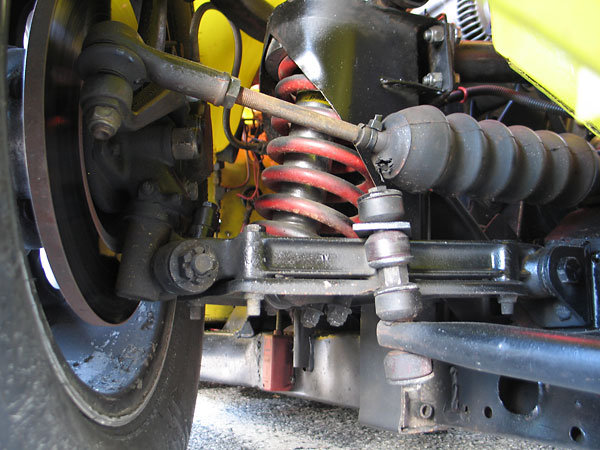
�
Lower control arm mounts have been moved slightly outboard to get somewhat negative static wheel camber.
�
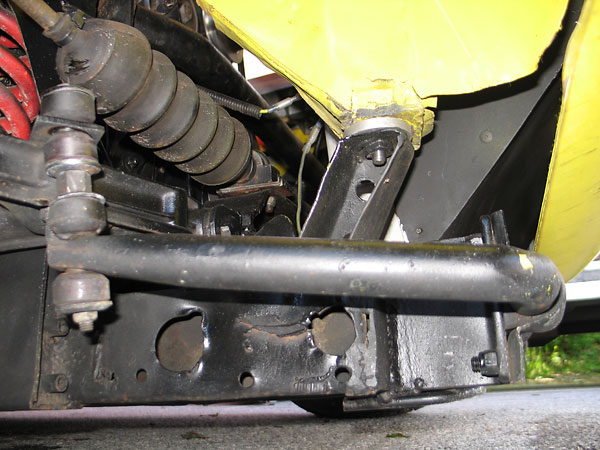
�
Triumph TR4 steering racks can be moved up or down by adding/removing shims to eliminate bump steer.
�
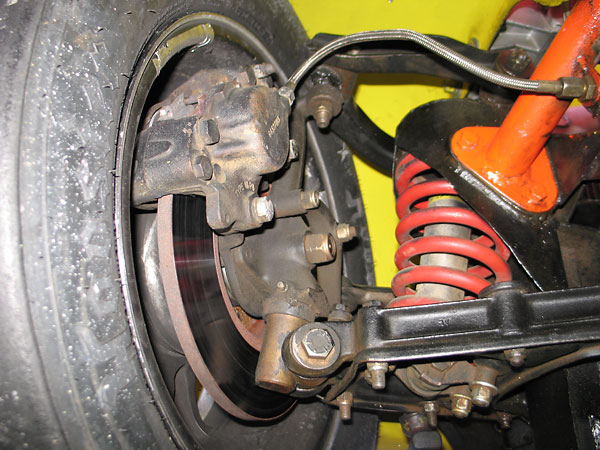
�
The front spring mounts have been braced rearward to the car's new roll structure.
�
�
Rear Suspension
��
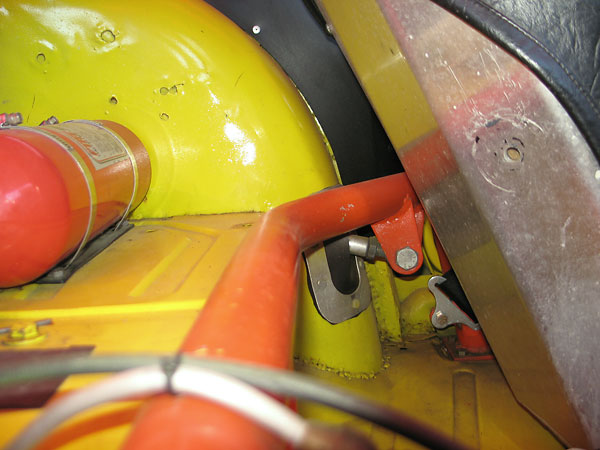
�
Trailing links back from the roll structure help locate the rear axle and prevent wind-up of the leaf springs.
�
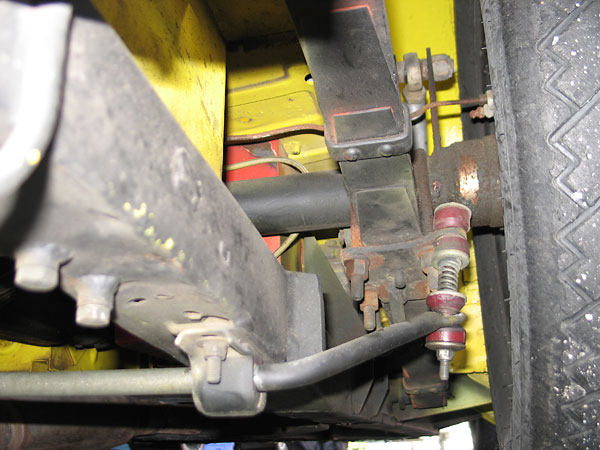
�
5/8" rear anti-sway bar on polyurethane mounts.
�
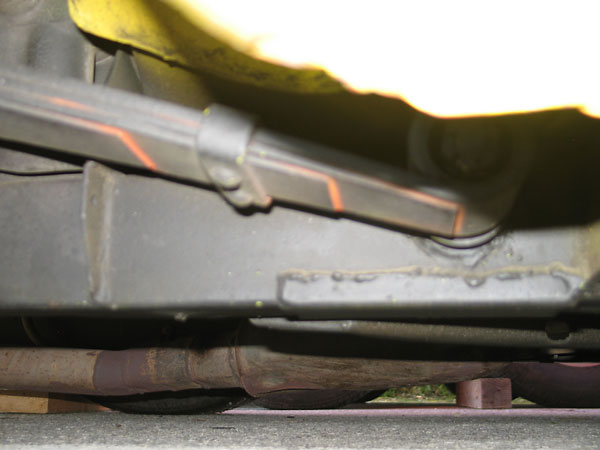
�
Leaf springs and lever-arm shock absorbers.
�
�
Interior / Roll Structure / Etc.
��
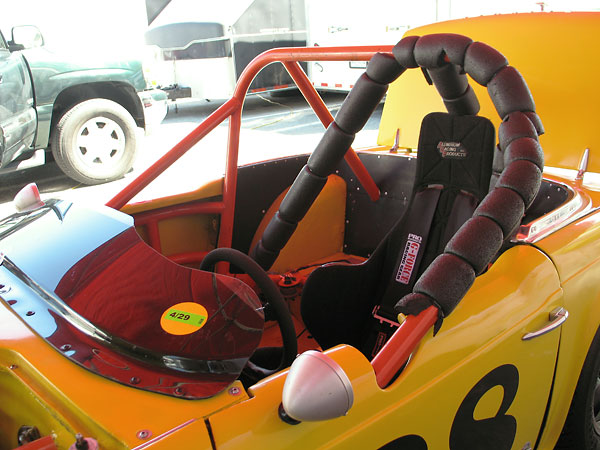
�
The roll hoop's door brace is positioned to provide shoulder room, and the door was modified to suit.
�
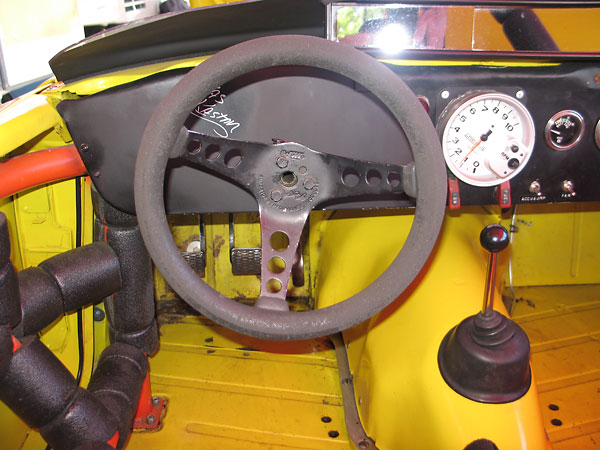
�
That's Triumph racing guru Kas Kastner's autograph on the dashboard.
�
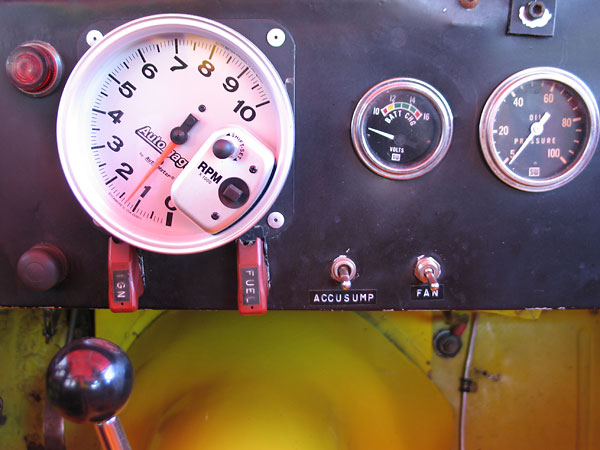
�
"Auto Gage by AutoMeter" tachometer (0-10000rpm).
�
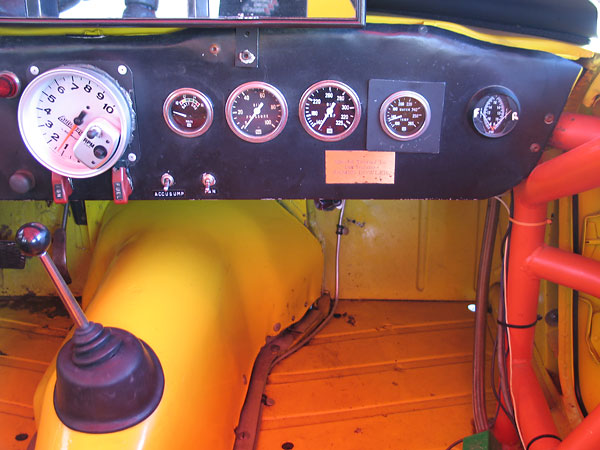
�
(left to right) Stewart Warner Volt meter, oil pressure gauge, oil temperature gauge,
�
and water temperature gauge. Westech dual pyrometer (700-1600F).
�
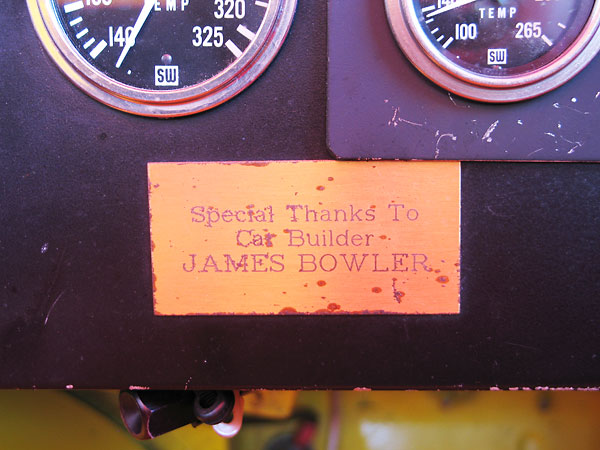
�
"Special Thanks to Car Builder James Bowler"
�
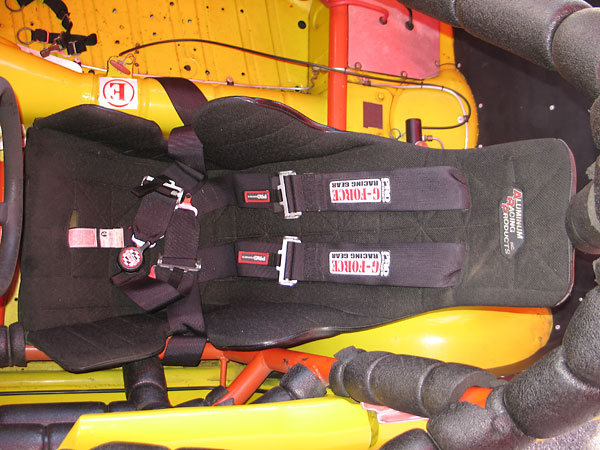
�
Aluminum Racing Products drivers seat. G-Force five point cam-lock safety harness.
�
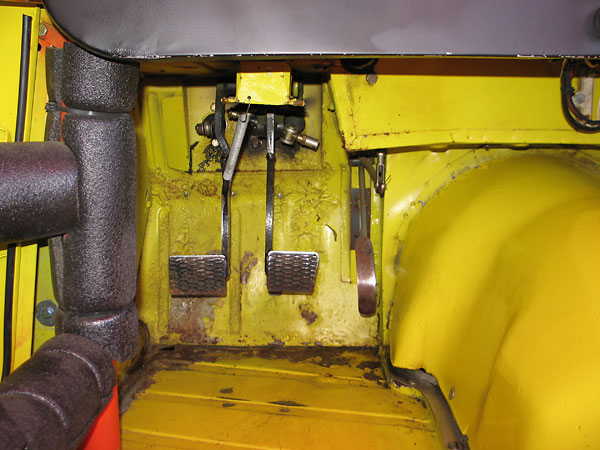
�
Comfortable footbox with lots of room for the pedals.
�
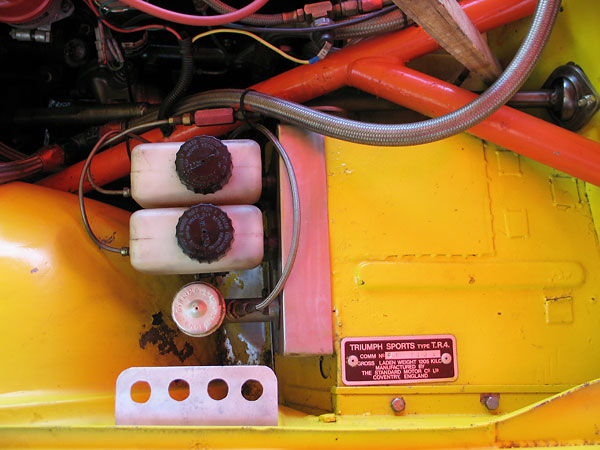
�
Dual Tilton master cylinders with bias bar. Wilwood residual pressure valve (red/10psi) on the rear circuit.
�
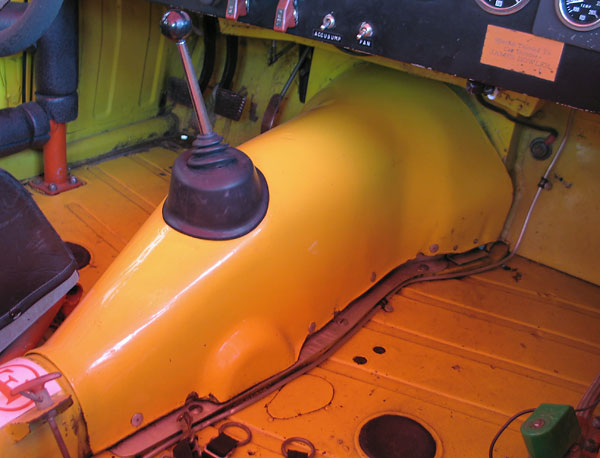
�
Plastic transmission cover in lieu of the original cardboard cover.
�
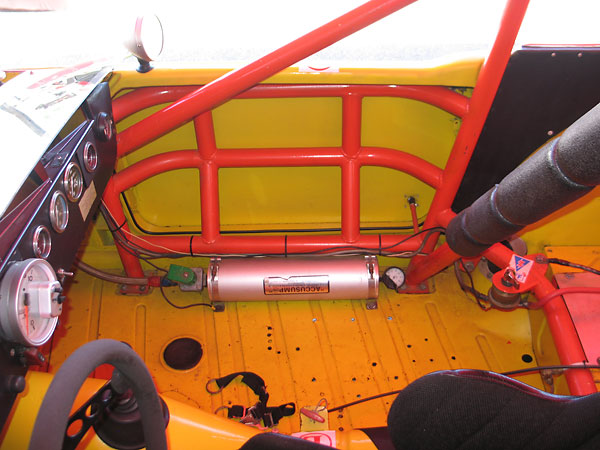
�
Accusump 3 quart oil accumulator with electrically operated valve.
�
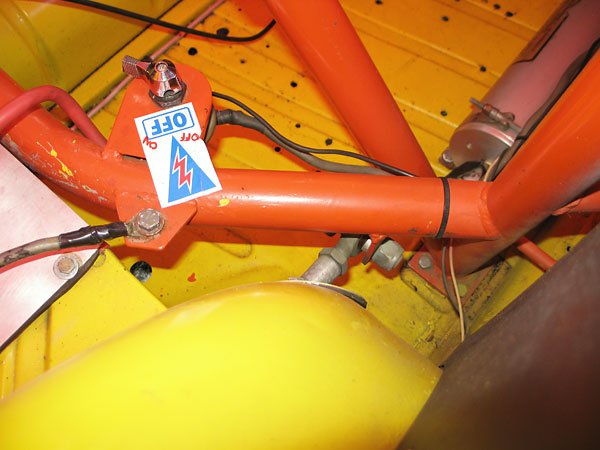
�
Battery disconnect switch.
�
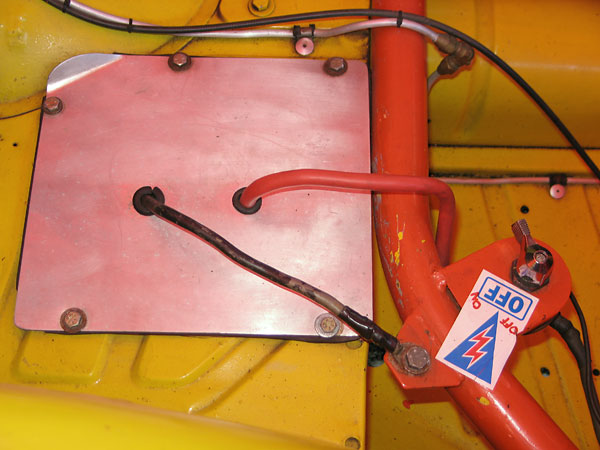
�
The battery has been relocated rearward, under the body and behind the seat, like on an MGB.
�
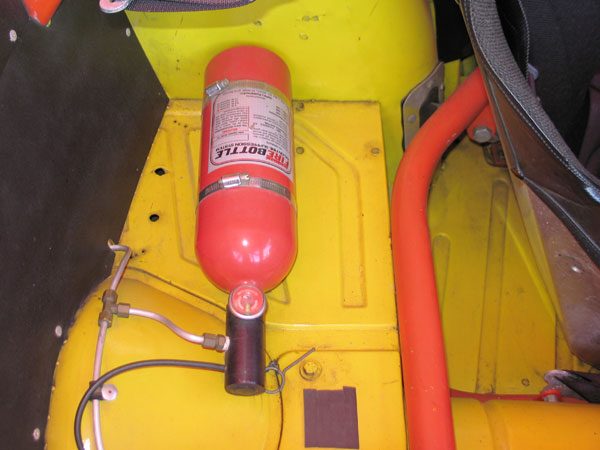
�
Safety Systems, Inc. FireBottle (5 pound Halon, manual pull-type) fire suppression system.
�
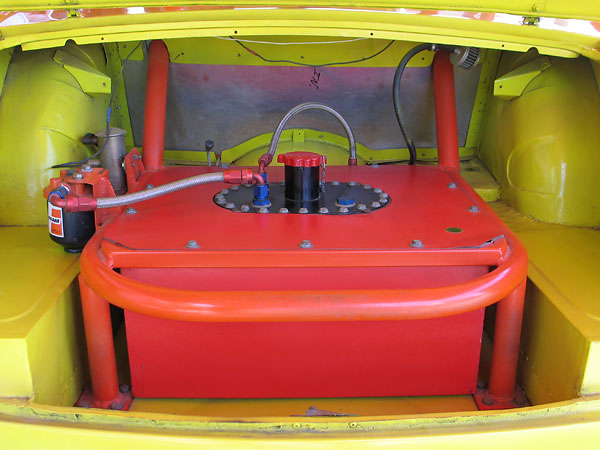
�
Fuel Safe 12 gallon fuel cell, Fram fuel filter, and Facet electric fuel pump.
�
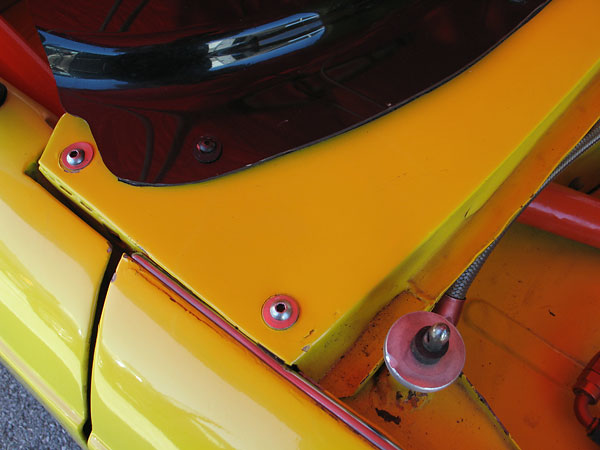
�
An easily removable cowl/windscreen assembly facilitates access to the gauges and their wiring.
�
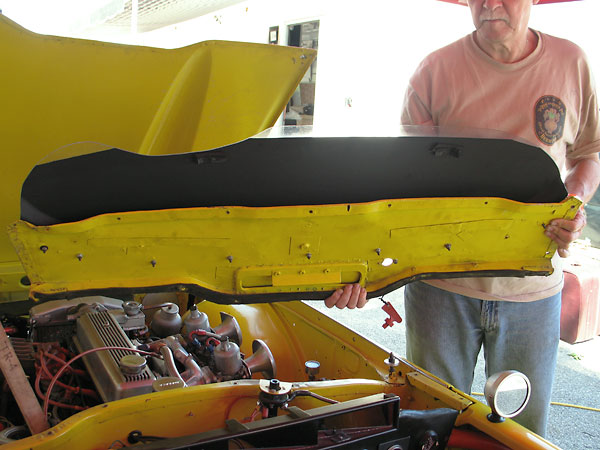
�
The cowl/windscreen assembly lifts off easily after removal of just eight bolts.
�
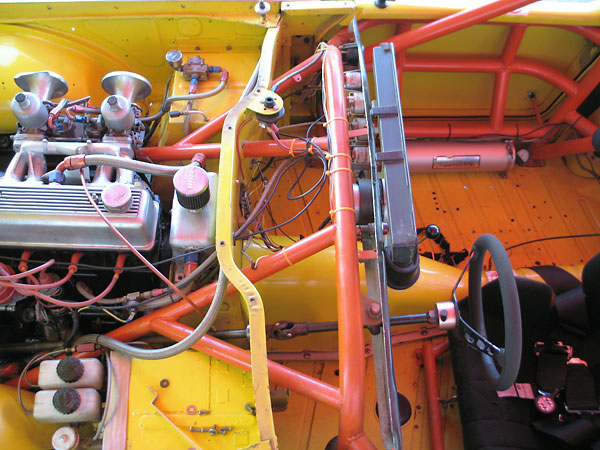
�
With the cowl removed, you can appreciate the strong structure underneath it.
�
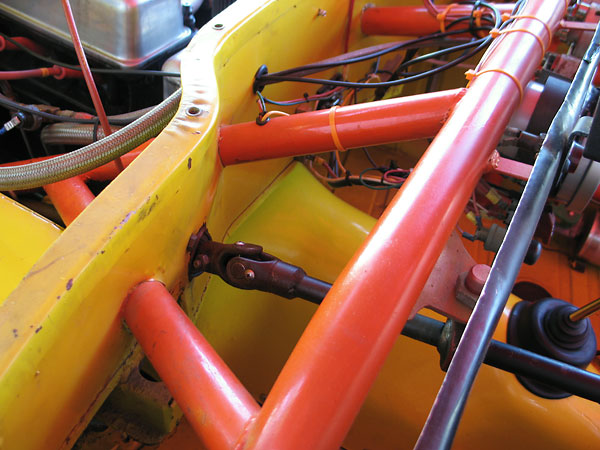
�
The steering linkage includes a Borgeson precision universal joint.
�
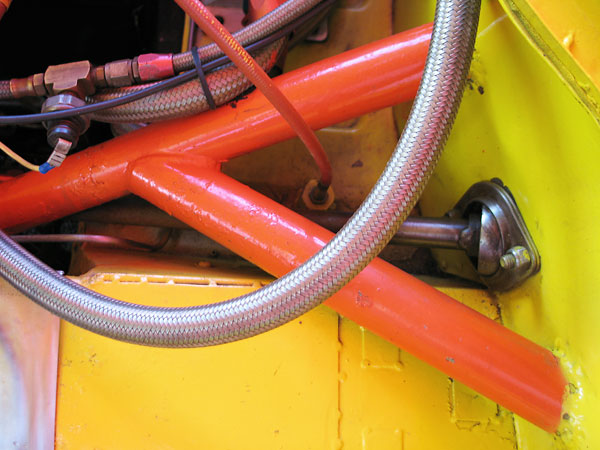
�
Spherical bearing support / bulkhead pass-through for the steering shaft.
�
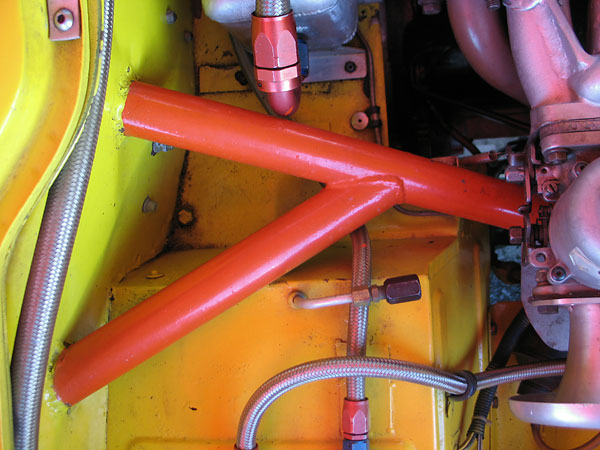
�
The roll structure continues forward to the front suspension, making this one very stiff Triumph TR4.
�
Note also the fire extinguisher system's nozzle, in close proximity to carburetors and fuel line.
�
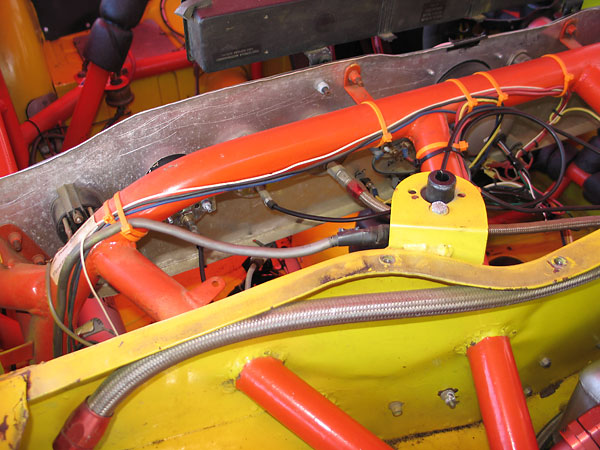
�
Lightweight aluminum sheetmetal dashboard.
�
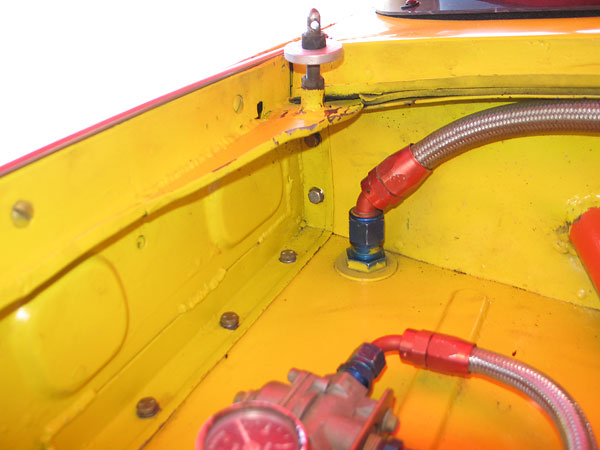
�
One of the great innovations of this particular Triumph TR4 is that the whole front clip has been modified
�
for serviceability. Starting with these bolts, it can be removed from the chassis in just a few minutes.
�
�
Exterior
��
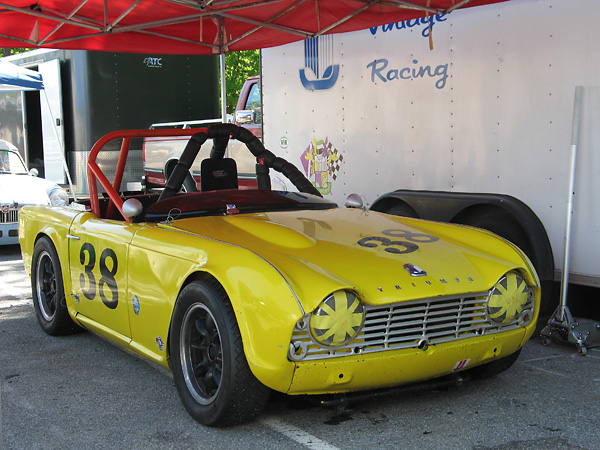
�
The Triumph TR4 body was designed under contract by Giovanni Michelotti.
�
New with this model: roll-up door windows!
�
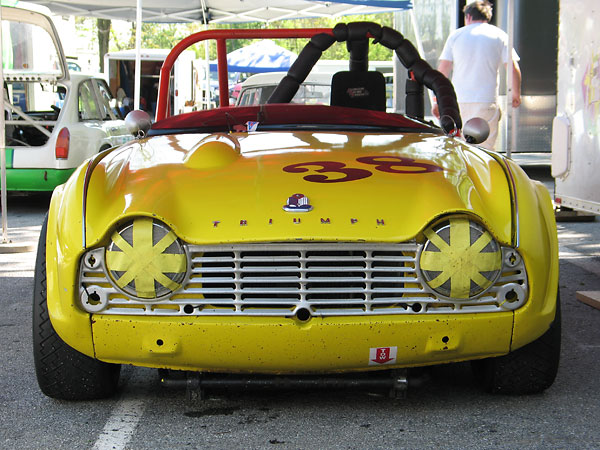
�
Triumph TR4 engines didn't come with manual starters, but the front grilles have holes for them anyway.
�
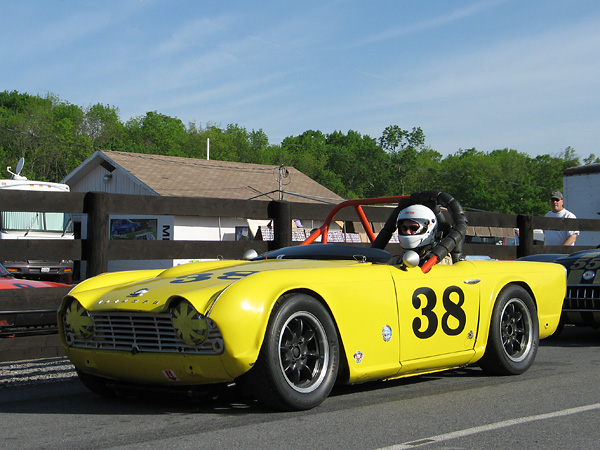
�
40,253 Triumph TR4 cars were built over the model's lifespan, which spanned from 1961 through 1965.
�
A stock/original Triumph TR4 weighs about 2,184 pounds and is capable of about 120 mph.
�
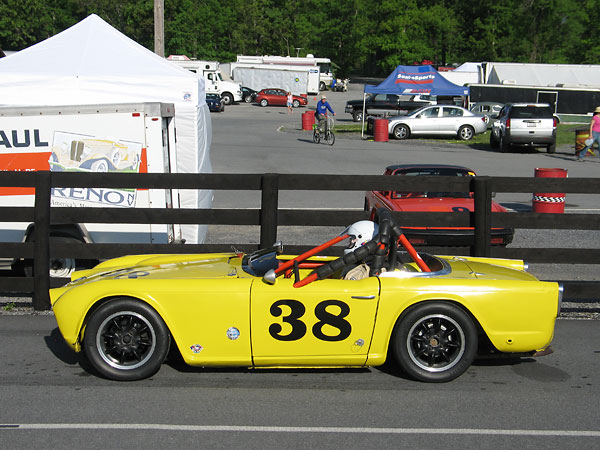
�
The Sports Car Club of America has historically grouped production cars into racing classes by engine
�
size. After the Triumph TR4 model's first full season of SCCA racing, in 1962 SCCA shifted displacement
�
limits with the effect that (2138cc) TR4s moved from E-Production to D-Production. That's where they've
�
raced ever since. Just for reference, MG's MGB model came with 1800cc engines and therefore they
�
compete in SCCA's E-Production class.
�
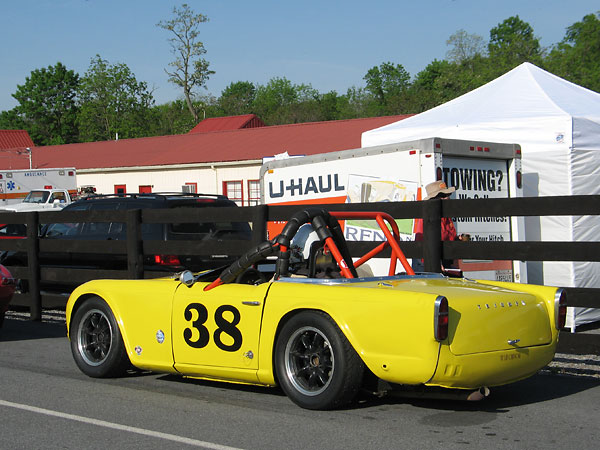
�
Triumph promoted the TR4 in North America by sponsoring two race teams. The west coast team was run
�
by Kas Kastner, who also started and ran Triumph's Competition Department. Bob Tullius' Group 44 team
�
held the contract to represent Triumph on the east coast. In 1962 and 1963 there were no SCCA national
�
races on the west coast, and thus no true SCCA national championship. Nonetheless, Tullius won SCCA
�
titles in those years. Real SCCA national championships started in 1964 with "runoffs" held at Riverside
�
and Daytona in alternating years. Bob Tullius won the 1964 SCCA D-Production National Championship
�
at Riverside California with his Triumph TR4.
�
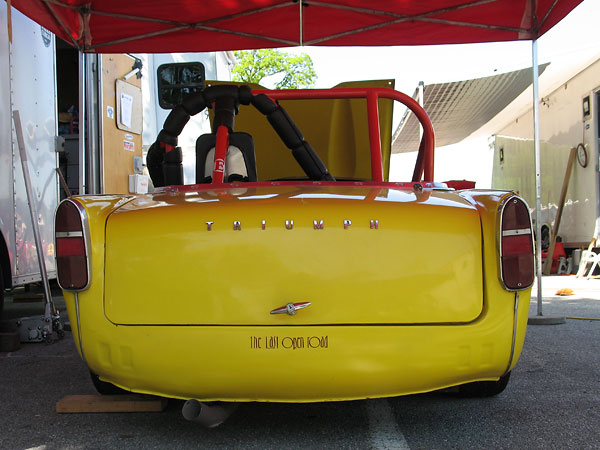
�
In 1965 the TR4 model was superseded by the TR4A; the main difference was independent rear suspension
�
in lieu of a live (solid) axle. However, to satisfy the concerns of dealers, Triumph decided to continue
�
offering live axles as optional equipment. About twenty-five percent of TR4A's were built with live axles.
�
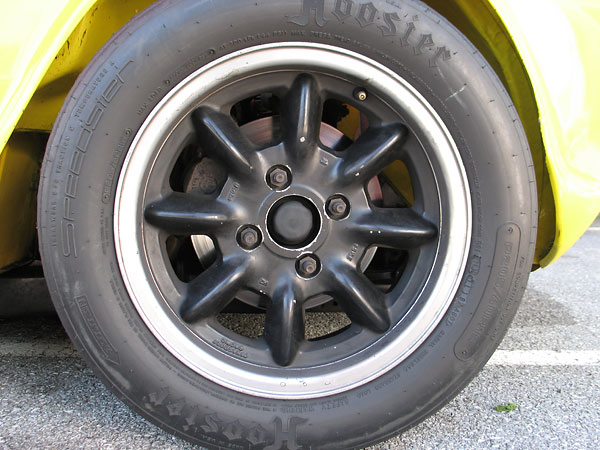
�
Panasport Racing 15" aluminum wheels.
�
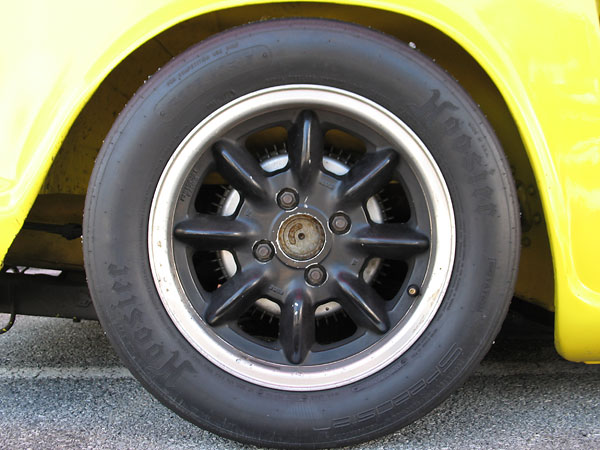
�
Hoosier Speedster 205/60 radial tires.
�
�
All photos shown here are from April 2010 when we viewed the car at VRG's Jefferson 500�
at Summit Point Motorsports Park, West Virginia. Photos by Curtis Jacobson for BritishRaceCar.com, �
copyright 2010. All rights reserved.
�
| If you liked this article, you'll probably also enjoy these: | �|||||
 | �
Mark Rosenberg '59 Peerless GT | �
 | �
Bill Thumel '61 Elva Courier | �
 | �
Richard Brown '64 Triumph Spitfire | �
| You're invited to discuss anything you've seen here on The British Racecar Motorsports Forum! | �|||||
�
Notice: all the articles and almost all the photos on BritishRacecar.com are by Curtis Jacobson.
�
(Photos that aren't by Curtis are explicitly credited.) Reproduction without prior written permission is prohibited.
�
Contact us to purchase images or reproduction permission. Higher resolution images are optionally available.
�

 �
�
